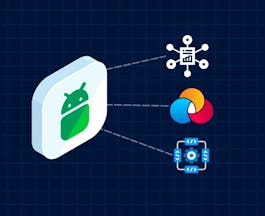Filter by
The language used throughout the course, in both instruction and assessments.
Explore the Mechanics Course Catalog

Board Infinity
Skills you'll gain: Android (Operating System), Android Development, Mobile Development, Software Architecture, Linux, Performance Tuning, Application Programming Interface (API)

University of Colorado Boulder

L&T EduTech

University of Maryland, College Park
Skills you'll gain: User Story, Scaled Agile Framework, Agile Project Management, Sprint Planning, Agile Software Development, Agile Methodology, Project Management, Kanban Principles, Lean Methodologies

University of Colorado Boulder

Skills you'll gain: Deep Learning, Artificial Neural Networks, Image Analysis, Keras (Neural Network Library), Tensorflow, Computer Vision, Artificial Intelligence and Machine Learning (AI/ML), Network Architecture, Network Model, Machine Learning Algorithms, Linear Algebra

University of Colorado Boulder

University of Maryland, College Park

Johns Hopkins University
Skills you'll gain: AWS SageMaker, Amazon Web Services, Tensorflow, Applied Machine Learning, Amazon Elastic Compute Cloud, Natural Language Processing, Artificial Intelligence and Machine Learning (AI/ML), Artificial Intelligence, Software Design, Machine Learning, Program Development, Application Development, Design Strategies, Computer Programming, Data Processing
In summary, here are 10 of our most popular mechanics courses
- Android Architecture/Multimedia Framework: Board Infinity
- Spacecraft Relative Motion Kinematics and Kinetics: University of Colorado Boulder
- Precast & Advanced Pile Foundation: L&T EduTech
- Applied Scrum for Agile Project Management: University of Maryland, College Park
- Unity Android — Build Eight Mobile Games with Unity and C#: Packt
- Spacecraft Relative Motion Control: University of Colorado Boulder
- Grouping, Testing & Quality Control of Pile Foundations: L&T EduTech
- Unreal Engine 5 - The Complete Beginner's Course: Packt
- Foundations of Deep Learning and Neural Networks: Packt
- Spacecraft Formation Flying and Control Capstone Project: University of Colorado Boulder















